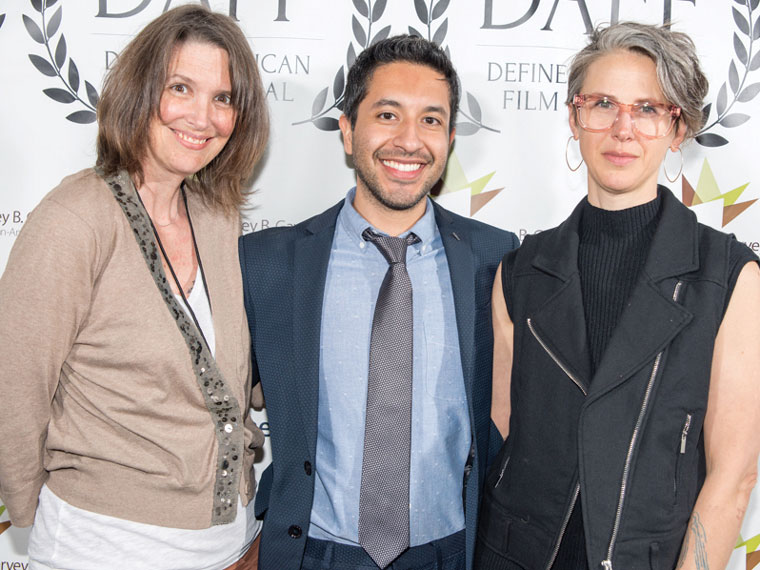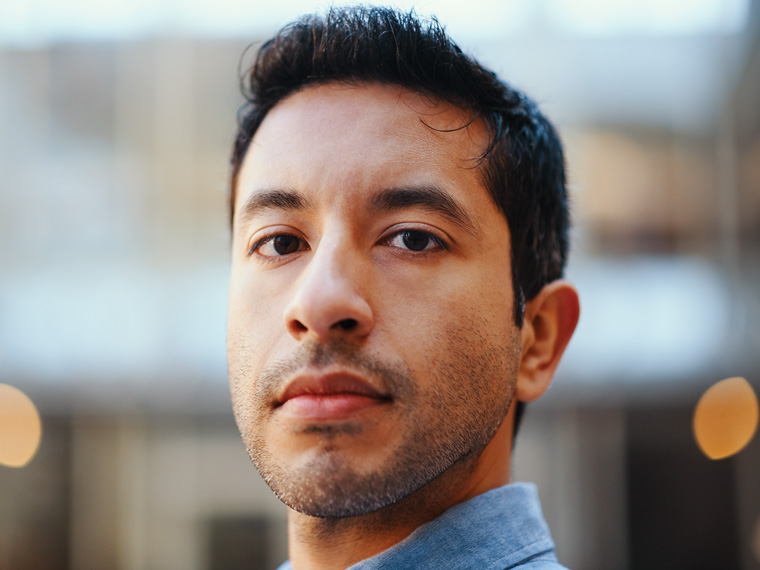A new documentary film casts Moises Serrano ’18 as a champion for undocumented young people across America.
The young man in the film could be any mother’s son. Fresh faced and energetic, in jeans and a white fleece jacket, he tells his story with a quiet urgency, in the kind of English we tend to think of as unaccented. But if his accent doesn’t betray much about his upbringing and ethnicity, his words instantly relate a story that’s both personal and, for a certain kind of American, universal.
“I’m undocumented,” he says to a crowd made up mostly of young Latinos. “I’ve been living in this state”—it’s North Carolina—“for over 21 years. My whole life I’ve had to listen to ‘wetback,’ ‘illegal,’ ‘beaner,’ ‘Mexican,’ because that was also used as a slur against me.” And as a gay man, he’s been subject to slurs of a different kind but with a similar purpose: to make him feel less human, less deserving, less American.
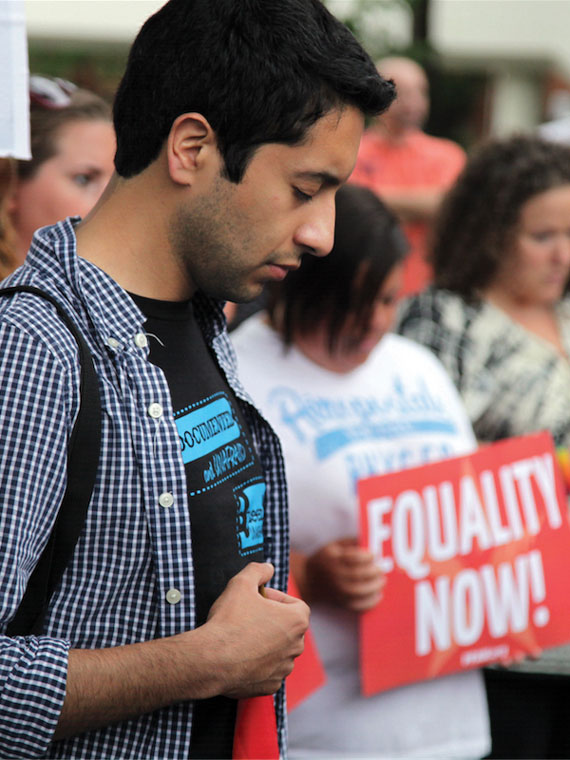 Early in the 82-minute documentary, Forbidden: Undocumented and Queer in Rural America, it’s clear that Moises Serrano ’18 is a storyteller by nature and by necessity. He felt compelled to tell his story—and, as he puts it, “come out of the shadows” as undocumented—in 2010 at the age of 21. “I was just done,” he says. “I was working at a dead-end job at a factory where I was facing homophobia and always living in fear of being laid off for not having proper documentation.” But it was also a time of ferment in the immigrant rights movement, which was actively pushing for a pathway to citizenship. “Here’s my chance,” Serrano thought. “I’m done hiding, and I want to share my story.”
Early in the 82-minute documentary, Forbidden: Undocumented and Queer in Rural America, it’s clear that Moises Serrano ’18 is a storyteller by nature and by necessity. He felt compelled to tell his story—and, as he puts it, “come out of the shadows” as undocumented—in 2010 at the age of 21. “I was just done,” he says. “I was working at a dead-end job at a factory where I was facing homophobia and always living in fear of being laid off for not having proper documentation.” But it was also a time of ferment in the immigrant rights movement, which was actively pushing for a pathway to citizenship. “Here’s my chance,” Serrano thought. “I’m done hiding, and I want to share my story.”
In the documentary, we see him telling his story to students, legislators, civic organizations, and anyone else who’ll listen. His goal: to give a face and voice to the undocumented community, particularly that part of the population known as “dreamers”—young people who were brought to the United States as children, many of whom retain few, if any, memories of their country of origin. At one point in the film, Serrano addresses a local meeting of the League of Women Voters, trying to get them to understand who he is. “Society told me, ‘Assimilate. Dress like us. Like the same music,’” he tells them. “So I grew up liking Backstreet Boys and Britney Spears.” The comment gets a laugh from the audience because, hey, their kids were BSB and Britney fans, too.
At its essence, that’s the message of Forbidden—that young people like Serrano are typically American, sharing typically American goals: going to college, finding a good job, falling in love, making a home. “Through Moises’ story,” says Tiffany Rhynard, the documentary’s producer/ director, “I want to humanize the issue of immigration.” To do that, she followed Serrano for two years, from 2012, when he was 23 and hitting his stride as an activist, to 2014, as he embarked, exhilarated and apprehensive, on a new life as an undergraduate at Sarah Lawrence.
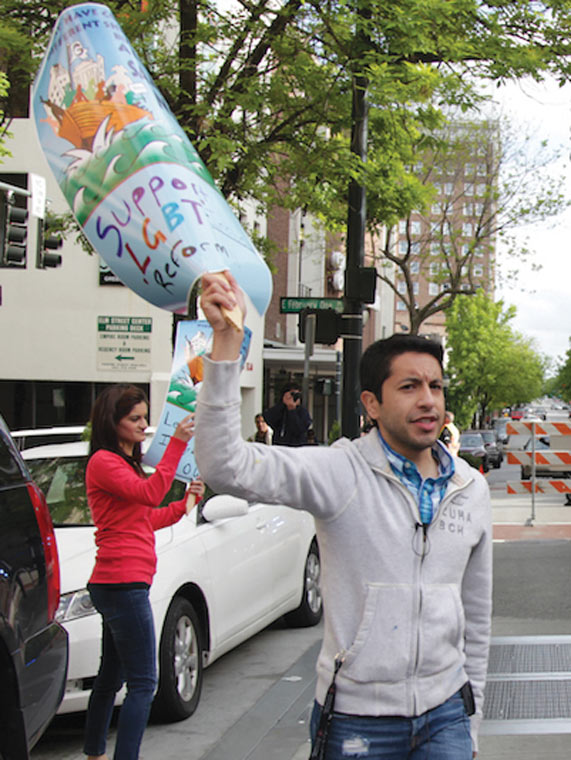 Those two years represent a period of enormous change and discovery for Serrano. Rhynard and Heather (Wedvick) Mathews ’95—a veteran film editor who studied literature, photography, and creative writing at Sarah Lawrence—deftly communicate that change in captured moments of elation and despair: Serrano’s near inability to breathe upon learning the Supreme Court has overturned the Defense of Marriage Act, the federal law that defined marriage as being between “one man and one woman”; his anxiety at filling out an application to Sarah Lawrence, despite being an exceptionally qualified candidate; the joy he experiences at receiving his college acceptance package, and later, the financial aid without which he could never have enrolled.
Those two years represent a period of enormous change and discovery for Serrano. Rhynard and Heather (Wedvick) Mathews ’95—a veteran film editor who studied literature, photography, and creative writing at Sarah Lawrence—deftly communicate that change in captured moments of elation and despair: Serrano’s near inability to breathe upon learning the Supreme Court has overturned the Defense of Marriage Act, the federal law that defined marriage as being between “one man and one woman”; his anxiety at filling out an application to Sarah Lawrence, despite being an exceptionally qualified candidate; the joy he experiences at receiving his college acceptance package, and later, the financial aid without which he could never have enrolled.
Those two years were also a time of discovery for the filmmakers, who learned how little they really knew about what it means to be undocumented. Rhynard says she had no idea that, since 2009, undocumented immigrants in North Carolina could no longer apply for a driver’s license—a situation that could turn a routine traffic stop into a potential deportation. (In 2013, the state began issuing licenses to recipients of Deferred Action for Childhood Arrivals status, legislation that afforded dreamers a reprieve from deportation.) Serrano’s oldest sister, who’s ineligible for DACA and is never identified by name in the film, notes that she’s afraid to drive her kids to the doctor, or hop in the car to buy groceries, or drive to work. “You’re a prisoner in your own house,” she says.
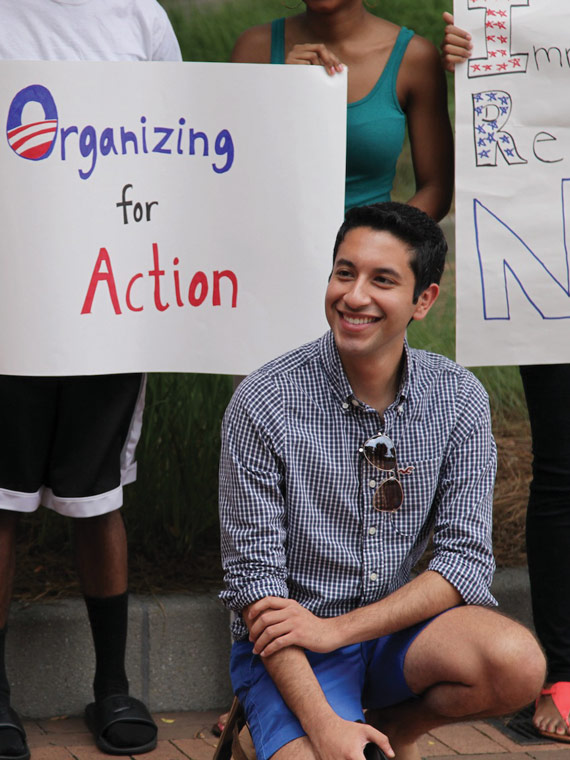 As Mathews scrolled through hundreds of hours of film, she was learning why so many young undocumented people suffer from depression. “They grow up thinking they’re Americans and have everything in front of them,” she says. “They do so well in school and they work so hard to get into college, and then they find out that they can’t go.” Some states bar undocumented students from attending community college; others, like North Carolina, charge them higher, out-of-state tuition. And many financial aid programs, including Federal Student Aid, are not available to undocumented students at all.
As Mathews scrolled through hundreds of hours of film, she was learning why so many young undocumented people suffer from depression. “They grow up thinking they’re Americans and have everything in front of them,” she says. “They do so well in school and they work so hard to get into college, and then they find out that they can’t go.” Some states bar undocumented students from attending community college; others, like North Carolina, charge them higher, out-of-state tuition. And many financial aid programs, including Federal Student Aid, are not available to undocumented students at all.
Neither Rhynard nor Mathews realized how draconian the process of applying for citizenship can be for dreamers. For Serrano, who’s now 28, to navigate those channels, he’d have to leave the US and wait 10 years before applying. Given that the review process for Latin Americans’ applications typically takes 10 to 15 years, he’d likely be in his 50s by the time his case was even considered. “The reality is that there’s no pathway toward citizenship for us,” he says.
Throughout his four years at Sarah Lawrence, Serrano has divided his time between schoolwork and traveling around the country to advocate for immigration reform. Like Rhynard and Mathews, he hopes Forbidden can help change not just hearts and minds, but legislation as well. As the credits roll, Ann Marie Dooley, a prominent immigration attorney, implores viewers to contact their representatives and express their position on the issue. “The opposition is very vocal,” notes Rhynard. “Opponents of immigration reform tend to call their representatives more often than supporters.”
Like all dreamers, Serrano lives in an emotionally corrosive atmosphere of perpetual uncertainty. “The fundamental thing I want to point out,” he says, “is that anti-immigrant legislation is a form of psychological warfare.” Asked what he plans to do after graduation, he says he has no idea. “Quite honestly,” he says, “it’s terrifying to think about the idea.”
If passed by Congress, the Dream Act would grant a pathway to citizenship for undocumented young people who entered the country before the age of 16 and fulfill other basic criteria. But if the bill isn’t passed into law, or if DACA, which was rescinded by the Trump administration in 2017, isn’t reinstated, Serrano won’t be able to work and will be at risk of deportation.
Asked what he’d do in an ideal world, his response is simple. “I’d just like to have a small sense of normalcy to my life,” he says. “In an ideal world, I would like to have a job where I can work nine to five, come home to my partner, and start building a future and a life and a family.”
It’s hard to imagine a dream more American than that.
Written by Leslie Garisto Pfaff
Photos by Laura Barisonzi, Kathi Barnhill, Tiffany Rhynard, and Andy Smith
Forbidden follows Serrano from 2012, when he was 23 and hitting his stride as an activist, to 2014, as he embarked on a new life as an undergraduate at Sarah Lawrence.
After graduating in May, Serrano hopes to create a scholarship for undocumented students at a community college in his home state of North Carolina.

